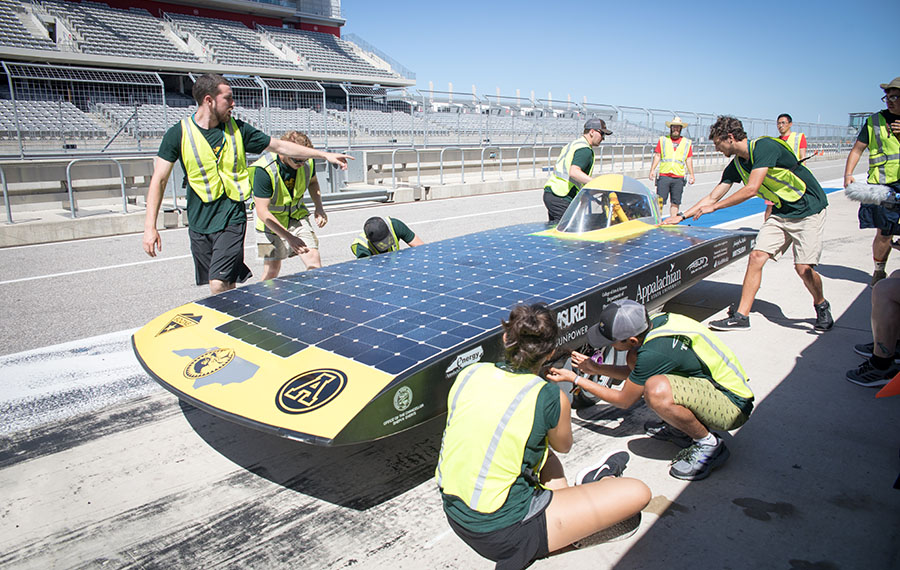
Appalachian’s Team Sunergy gained respect for its pit stop strategy and discipline during the 2017 Formula Sun Grand Prix. The team took second place in the race, which was held at the Circuit of The Americas track in Austin, Texas. With help from Sterling Planet, the team aspires to set a carbon-neutral standard for the brain sport of solar racing. Photo by Marie Freeman
Alpharetta, G.A. — Team Sunergy, Appalachian State University’s lauded solar vehicle team, is offsetting its carbon footprint thanks to a donation of 58 metric tons of greenhouse gas (GHG) emission reductions by Sterling Planet, a sustainable energy solutions provider, and General Motors. The offsets provided were created through GM’s electric vehicle (EV) ChargePoint and EverCharge charging programs, and solar generation at GM’s Global Technical Center in Warren, Michigan. Sterling Planet calculated and confirmed the volume.
“Appalachian State University is extremely involved in mitigating its carbon footprint,” said Val Johnson, vice president of origination at Sterling Planet, who has worked closely with the university on multiple projects. “They are very concerned with the impact of their community on the planet.”
Appalachian’s chancellor, Dr. Sheri Everts, who has led the university to earn top ratings from numerous organizations that set the standards for sustainability leadership, said, “Appalachian’s long-standing sustainability leadership and practices are the foundation of who we are as an institution. We are pleased to partner with industry leaders like Sterling Planet and General Motors, who recognize the value in developing sustainable technology and support educational institutions that prioritize research in this area.”
Team leader Dan Blakeley, who is currently pursuing dual master’s degrees in appropriate technology and engineering physics at Appalachian, challenged Team Sunergy to set a carbon-neutral standard for the brain sport of solar racing.
“While the technology we are developing is carbon neutral, the sport is not,” said Blakeley. “Transporting and racing solar vehicles requires the use of support vehicles powered by fossil fuels. Our team took on the challenge of offsetting our carbon footprint so we could lessen our environmental impact as we develop technology that will do the same.”
The current project to counter energy use associated with Team Sunergy’s efforts was brought to Sterling Planet’s attention by David “Duvey” Rudow, who served as assistant project director for Team Sunergy and graduated from Appalachian in December 2017 with a master’s degree in engineering physics.
Team Sunergy determined it uses the equivalent of approximately 50 to 55 metric tons of carbon dioxide per semester and wanted to find a carbon offset that aligned closely with its mission.
Since transportation GHG emission reductions are challenging to find, Alden Hathaway, senior vice president of business development at Sterling Planet, reached out to his contacts at GM for a solution. “General Motors has been an important advocate for a carbon-free transportation sector and values the ongoing collaboration with The American Solar Challenge through Appalachian State University,” said Hathaway.
At GM’s Global Technical Center, employees often drive EVs to work. These are charged at GM charging stations, and the site has a number of on-site solar photovoltaic installations. The ChargePoint array boasts 72 charging units, while the EverCharge pilot program has seven dual charging stations. Carbon offsets were created through the alternative energy resource — neutralizing fuel emissions — accounted for by Sterling Planet, and GM has gifted these offsets to Sterling Planet to benefit Team Sunergy.
“Partnerships across all sectors help to advance technology and infrastructure,” said Al Hildreth, global energy manager for General Motors. “The work done through The American Solar Challenge helps to drive our promise to deliver safer, better and more sustainable mobility solutions.”
Team Sunergy has won international recognition for Appalachian. Most recently, in July 2017, its vehicle, Apperion, brought home second place in the Formula Sun Grand Prix in Austin, Texas. The team is now in the design process for their next generation vehicle to be entered in The American Solar Challenge in the summer of 2018, and has aspirations to qualify for the World Solar Challenge in 2019.
Appalachian and Sterling Planet also partner to mitigate the CO2 associated with student, staff and faculty driving through Appalachian’s Carbon Neutral Commuter program, and to offset the emissions from participant travel for the university’s Alternative Service Experience program, which immerses students, faculty and staff in local, domestic and international communities to serve and build relationships in those communities.
About App State’s Team Sunergy
Appalachian State University’s internationally recognized Team Sunergy is an interdisciplinary, student-led team with a passion for sustainable transportation — and the ingenuity, innovation and drive to create it. The team began in fall 2013, as a class project to build a solar-powered golf cart, and has evolved into an award-winning program that has achieved podium finishes in every year of competition in both the Formula Sun Grand Prix and American Solar Challenge (ASC), including a first-place finish in the 2021 ASC. Both races set the standards for and test the limits of solar vehicle technology. Team Sunergy’s first vehicle, Apperion, was a modified single-occupant race car. In 2018, the team designed and built its current, two-passenger, Cruiser Class car, ROSE (Racing on Solar Energy), from the ground up. Learn more at https://sunergy.appstate.edu.
About Sterling Planet
Sterling Planet delivers innovative energy solutions that benefit the environment. Since 2000, the Atlanta, Georgia-based company has offered business and residential customers renewable energy certificates as an easy, affordable way to reduce the impact of everyday electricity use. Their comprehensive portfolio of solutions has since grown to include carbon offsets, energy efficiency solutions and green power project development.
Contacts
Sterling Planet Inc. contact:
Kelly Keswick, Director of Marketing and Communications
678-325-7105
[email protected]
Appalachian State University contact:
Megan Hayes, Director of University Communications
828-262-7983
[email protected]
What do you think?
Share your feedback on this story.




![How NCInnovation Is Rethinking Economic Development in North Carolina [faculty featured]](/_images/_posts/2026/02/rethinking-economic-development-600x400.jpg)






